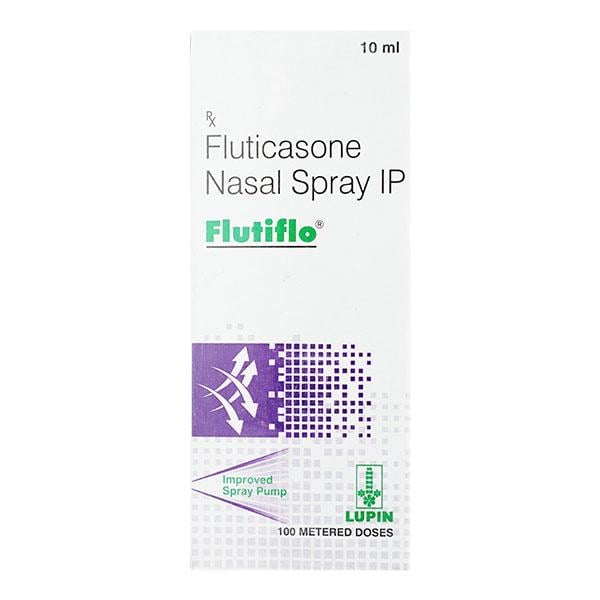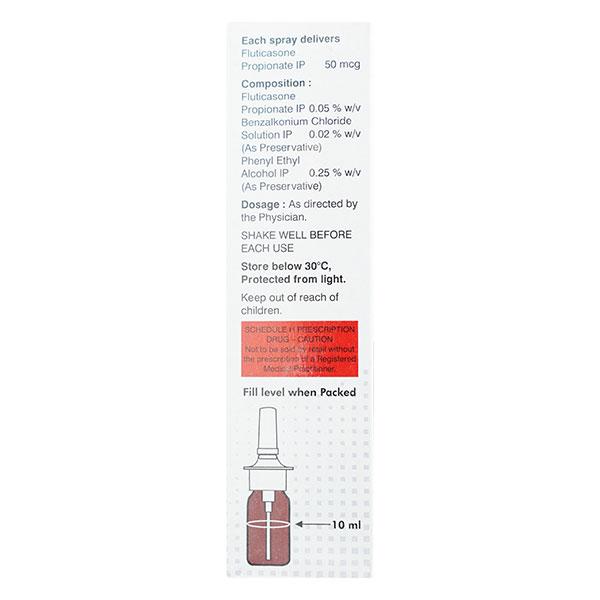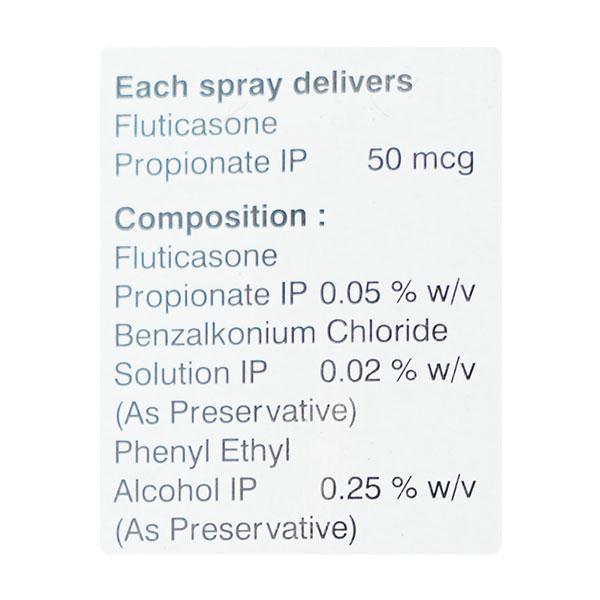

Netmeds First Membership
Quick Links
Introduction About FLUTIFLO NASAL SPRAY
FLUTIFLO NASAL SPRAY contains Fluticasone which belongs to the group of medicines called Corticosteroids (glucocorticoids). It is used to manage symptoms of allergic rhinitis such as stuffy, runny, or itchy nose, sneezing, itchy, red, or watery eyes in adults and children above 6 years of age.
Allergic rhinitis may be defined as an inflammatory disease of the nasal mucosa caused due to allergies caused form certain things such as pollen from grass or trees, animals (cats and dogs), house-dust mites, or moulds.
Before using FLUTIFLO NASAL SPRAY tell your doctor if you have severe liver disease, any history of eye conditions such as glaucoma (increase in pressure in the eye) or cataracts (clouding of the lens of the eye), or had nose surgery, or got an infection in your nose.
FLUTIFLO NASAL SPRAY should not be used in pregnant and breastfeeding women, unless advised clearly necessary by the doctor. Contact your doctor before using. FLUTIFLO NASAL SPRAY is not recommended for use in children below 6 years of age. FLUTIFLO NASAL SPRAY should be used with caution in elderly patients. Therefore, contact your doctor before using.
The most common side effects of using FLUTIFLO NASAL SPRAY include nosebleeds (generally minor), nasal ulceration, headache, and shortness of breath. Contact your doctor if any of these worsen or doesn’t improve.
Uses Of FLUTIFLO NASAL SPRAY
- manages symptoms of allergic rhinitis such as stuffy, runny, or itchy nose, sneezing, itchy, red, or watery eyes in adults and children above 6 years of age
How FLUTIFLO NASAL SPRAY Works
FLUTIFLO NASAL SPRAY causes vasoconstriction (constriction of blood vessels) and has anti-inflammatory activity. It directly decreases the cells that cause inflammation such as eosinophils, monocytes, mast cells, macrophages, and dendritic cells. FLUTIFLO NASAL SPRAY also decreases mucus gland secretions. Therefore, helps in reducing inflammation and making it easier to breathe.
How to use FLUTIFLO NASAL SPRAY
Use FLUTIFLO NASAL SPRAY as advised by your physician. It is for intranasal use only. Shake the bottle before every use. Your doctor will decide what quantity of dose you require at what frequency depending on the severity of the disease and your physical characteristics. Do not start or stop the medicine without consulting your doctor.
Side Effects Of FLUTIFLO NASAL SPRAY
Common
- nosebleeds (generally minor)
- nasal ulceration (irritation or discomfort in the nose, streaks of blood while blowing the nose)
- headache
- shortness of breath
Uncommon
- pain, burning, irritation, soreness, or dryness inside the nose
Rare
Stop using FLUTIFLO NASAL SPRAY and contact your doctor immediately if you experience any of the following side effects:
- allergic reactions (symptoms include wheezing, coughing, or difficulty breathing, sudden weakness or light-headedness (leading to collapse or loss of consciousness), swelling around the face, skin rashes or redness
- blurred vision or other visual disturbances
How To Manage Side Effects
Headache:
Rest and relax. Drink plenty of water and electrolytes. Apply a pain-relieving balm on the head if required. Do not consume alcohol. Contact your doctor if your headache did not improve.
Warning & Precautions
Pregnancy
FLUTIFLO NASAL SPRAY should not be used in pregnant women, unless advised clearly necessary by the doctor. Contact your doctor before using.
Breastfeeding
FLUTIFLO NASAL SPRAY should not be used in breastfeeding women, unless advised clearly necessary by the doctor. Contact your doctor before using
Driving and Using Machines
FLUTIFLO NASAL SPRAY is unlikely to affect your ability to drive and use machines.
Liver
FLUTIFLO NASAL SPRAY should be used with caution in patients having severe hepatic impairment. Consult with your doctor before using.
Allergy
Do not use FLUTIFLO NASAL SPRAY if you are allergic to Fluticasone or any of the other ingredients of this medicine.
Others
Before using FLUTIFLO NASAL SPRAY tell your doctor if you have:
- history of eye conditions such as glaucoma (increase in pressure in the eye) or cataracts (clouding of the lens of the eye)
- had a nose surgery
- an infection in your nose
Use in Paediatrics:
FLUTIFLO NASAL SPRAY is not recommended for use in children below 6 years of age. Occurrence of growth retardation is possible with prolonged use of FLUTIFLO NASAL SPRAY. Your doctor will keep a check on the child’s height and modify the doses as required. Therefore, contact your child’s doctor before using FLUTIFLO NASAL SPRAY for your child.
Use in Geriatrics:
FLUTIFLO NASAL SPRAY should be used with caution in elderly patients. Therefore, contact your doctor before using.
Interactions
A. Drug-Drug Interactions:
Before using FLUTIFLO NASAL SPRAY, tell your doctor if you are taking, or have recently taken any of the following medicines:
- medicines used to manage HIV (Ex. ritonavir, cobicistat)
- medicine used to manage fungal infections (Ex. ketoconazole)
- medicines used to manage asthma (Ex. theophylline)
- medicines used to manage inflammation such as steroids (Ex. prednisolone)
Overdosage:
If you or anyone else accidentally ingests or uses too much of FLUTIFLO NASAL SPRAY, consult your doctor immediately or visit the nearby hospital.
Synopsis
| Drug | : | Fluticasone |
| Pharmacological Category | : | Corticosteroid |
| Therapeutic Indication | : | Allergic Rhinitis |
| Dosage Forms | : | Capsule, Cream, Inhaler, Innospray, Lotion, Nasal Spray, Nasal Drops, Ointment, Respules, Rotacaps, Spray |
More Information
- Keep FLUTIFLO NASAL SPRAY out of sight and reach of children
- Store FLUTIFLO NASAL SPRAY at room temperature below 30°C
FAQs About FLUTIFLO NASAL SPRAY
What is FLUTIFLO NASAL SPRAY and why is it prescribed?
FLUTIFLO NASAL SPRAY contains Fluticasone which belongs to the group of medicines called Corticosteroids (glucocorticoids). It is used to manage symptoms of allergic rhinitis such as stuffy, runny, or itchy nose, sneezing, itchy, red, or watery eyes in adults and children above 6 years of age.
Is it safe to use FLUTIFLO NASAL SPRAY for a long time?
Occurrence of growth retardation is possible with prolonged use of FLUTIFLO NASAL SPRAY. Your doctor will keep a check of the child’s height and modify the doses as required. Nosebleeds (generally minor), may occur if used continuously for more than 6 weeks Therefore, contact your doctor before using.
Is FLUTIFLO NASAL SPRAY a steroid?
Yes, FLUTIFLO NASAL SPRAY is corticosteroid which causes vasoconstriction (constriction of blood vessels) and has an anti-inflammatory activity. It directly decreases the cells that cause inflammation such as eosinophils, monocytes, mast cells, macrophages, and dendritic cells. FLUTIFLO NASAL SPRAY also decreases mucus gland secretions. Therefore, helps in reducing inflammation and making it easier to breathe.
What are the things I need to take care of while using FLUTIFLO NASAL SPRAY?
FLUTIFLO NASAL SPRAY is administered by intranasal route as a spray which produces a mist, do not let the liquid, or the mist produced by FLUTIFLO NASAL SPRAY, get into your eyes by wearing glasses or goggles to protect them. Use your nebuliser in a well-ventilated room as some of the mist will be released into the air which may be inhaled by others.
Can FLUTIFLO NASAL SPRAY be used in children?
FLUTIFLO NASAL SPRAY is not recommended for use in children below 6 years of age. Your doctor will keep a check of the child’s height and modify the doses as required. Therefore, contact your child’s doctor before using FLUTIFLO NASAL SPRAY for your child.
References
1. K.D. Tripathi. Respiratory System Drugs. Essentials of Medical Pharmacology. Eighth Edition. 2019. Page 250.
2. Kailey Remien, Andy Bowman. Fluticasone. NIH National Library of Medicine, National center for biotechnology information. StatPearls. June 2022. [Accessed on 13th Oct 2022]. https://www.ncbi.nlm.nih.gov/books/NBK542161/
3. Pedro Giavina-Bianchi, Rosana Agondi, Rafael Stelmach, Alberto Cukier, Jorge Kalil. Fluticasone furoate nasal spray in the treatment of allergic rhinitis. NIH National Library of Medicine National Centre for Biotechnology Information. Pubmed Central. April 2008. [Accessed on 13th Oct 2022] https://www.ncbi.nlm.nih.gov/pmc/articles/PMC2504057/
4. Keith Kleinman. Fluticasone. Science Direct. [Accessed on 13th Oct 2022]. https://www.sciencedirect.com/topics/medicine-and-dentistry/fluticasone
5. Glaxo Operations UK Ltd. UK. Electronic Medicines Compendium (EMC). [Revised in Feb 2022]. [Accessed on 13th Oct 2022] https://www.medicines.org.uk/emc/files/pil.6439.pdf
6. Physicians Total Care, Inc. [Revised in Sep 2010] [Accessed on 13th Oct 2022] https://dailymed.nlm.nih.gov/dailymed/drugInfo.cfm?setid=8eaee9bf-91c7-484b-b8b1-b8242198181f
7. Cipla Ltd. Furamist Nasal Spray (Fluticasone). Ciplamed. [Revised in October 2021]. [Accessed on 13th Oct 2022]. https://www.ciplamed.com/content/furamist-nasal-spray
8. Cipla Ltd. Flomist Aqueous Nasal Spray (Fluticasone). Ciplamed. [Revised in September 2013]. [Accessed on 13th Oct 2022] https://www.ciplamed.com/content/flomist-aqueous-nasal-spray
9. Entodd Pharmaceuticals Pvt Ltd. Rhinofit F Nasal Spray (Fluticasone). [Accessed on 13th Oct 2022]. https://entopedia.com/products/rhinofit-f-nasal-spray/
Useful Diagnostic Tests
- Percutaneous skin test
- Allergen-specific immunoglobulin E (IgE) antibody test










